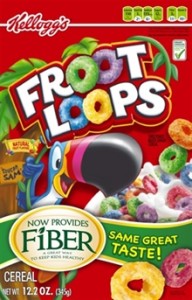Join Health Affairs for a virtual conversation between me and Angela Odoms-Young of Cornell University discussing the evolution of US food and nutrition policy, the current policy landscape, and thoughts on what lies ahead. It’s at 1:00 p.m. EDT. To join the Webinar, click here.
Kellogg’s asks for a Froot Loops correction. More on Smart (?) Choices

Earlier this week, I received a phone call from Dr. Celeste Clark, Kellogg’s senior vice president for global nutrition, corporate affairs and chief sustainability officer.
She had seen my previous blog post on the Smart Choices program, and wanted me to know that Froot Loops has been reformulated to contain 3 grams of fiber, not less than 1 gram, as I had posted, and that in all fairness, I ought to post the new version. Sure. Happy to. Here it is.
This higher fiber product, of course, gets us into the philosophical question: Is a somewhat-better-for-you, highly processed food really a good choice? Does the additional 2.5 grams of fiber convert this product to a health food? Whether Froot Loops really is a better choice than a doughnut as the Smart Choices program contends, seems debatable.
If I read the Nutrition Facts and ingredient list correctly, Froot Loops cereal contains:
- No fruit
- Sugar as the first ingredient (meaning the highest in weight–41%)
- Sugar as 44% of the calories
- Partially hydrogenated vegetable oil and, therefore, trans fat (although less than half a gram per serving so the label can read zero)
But with an implied endorsement from the American Society of Nutrition, which is managing the Smart Choices program, I guess none of that matters. Or maybe the added fiber cancels all that out?
I pointed out to Dr. Clark that I had just bought the fiberless Froot Loops at a grocery store in midtown Manhattan, which means the old packages must still be on the market.
I discussed this and other such products with William Neuman of the New York Times whose reporting on the Smart Choices program appears on the front page of today’s business section under the title, “For your health, Froot Loops. Industry-backed label calls sugary cereal a ‘Smart Choice.'”
According to his well reported account, Kellogg’s and other participating companies pay up to $100,000 for that seal. No wonder the American Society of Nutrition and everyone else involved in the program want to set nutrition standards so loosely that they can encompass as many products as possible. The more products that qualify for the Smart Choices logo, the more money the program gets. I’d call that a clear conflict of interest.
Neuman managed to find nutritionists who defend the program. I am not one of them.
Update September 6: CBS did a story on Smart Choices (I’m interviewed in it)
Update September 9: The American Society of Nutrition must be getting a bit defensive about the negative publicity, as well it should be. It has issued an explanation to members.

